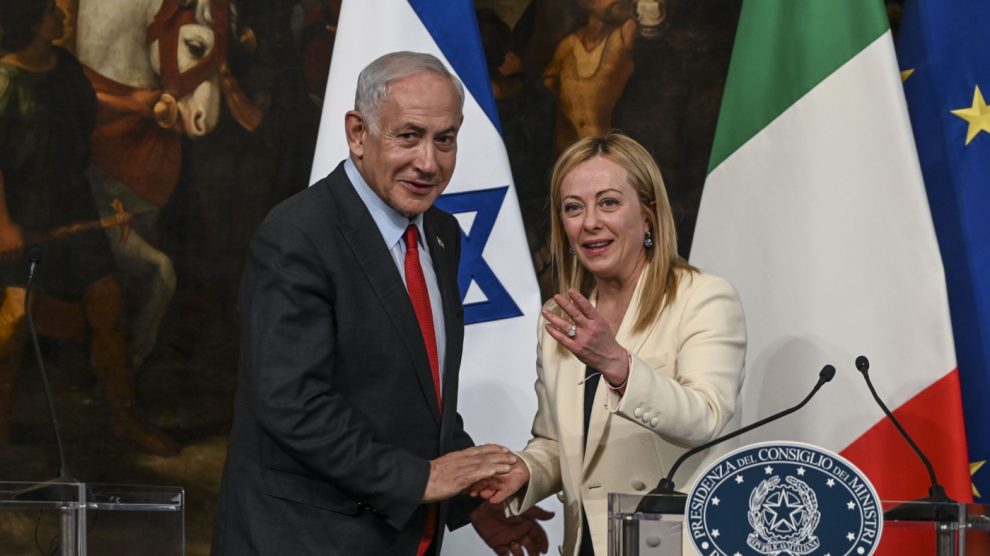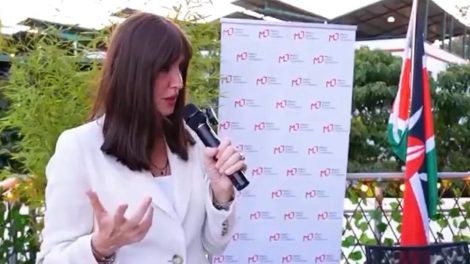Bibi in Rome. On Friday, Israeli Prime Minister Binyamin Netanyahu was welcomed by his Italian homologue – and fellow conservative leader – Giorgia Meloni. The two have known and esteemed each other “for a long time,” she said after a working lunch, while the former noted he was “very impressed” by her leadership.
- Back in June 2022, then-PMs Naftali Bennett and Mario Draghi vowed to strengthen Israel-Italy relations. Then their majorities collapsed, and both countries went back to the polls, from which Mr Netanyahu and Ms Meloni emerged victorious.
- Meanwhile, the two countries kept fostering their ties. Italian FM Antonio Tajani is expected in Israel soon, whereas Senate President Ignazio La Russa visited recently.
Focus on business. Earlier, the Israeli PM took part in the first Economic Forum for Italian companies with Adolfo Urso, Minister of Enterprise and Made in Italy. Back in December, along with Israeli Ambassador Alon Bar, he activated a working group to improve industrial, technological and scientific cooperation.
- PM Netanyahu told Italian managers the countries need a “quantum leap” in bilateral cooperation and pushed for yearly intergovernmental meetings to relaunch the strategic partnership – a proposal PM Meloni later accepted.
- The last such meeting was held in 2013, and the next one should be held in Israel “as soon as possible,” she said: possibly by year’s end.
- “Europe’s destiny is played out in the Mediterranean, and our countries together can show the way forward,” stressed Minister Urso, “also because they have complementary economic and production systems, which are particularly congenial for facing the new technological frontiers.”
Who was there. Over fifty representatives of Italian companies and organisations with interests in Israel, amounting to a total turnover of roughly €300 billion, were at the event. Talks encompassed security, energy, digitalisation, health, water, agriculture and innovation, with special attention to the green transition through renewable energy and technological innovation applied to industry.
- Present, among others: Eni, Enel, Edison and Snam (energy); Leonardo, Fincantieri, Iveco and Thales Alenia (defence and space); CDP, Simest, FS, Ita, Pizzarotti, Granarolo, Iren, Acea, Poste and Confagricoltura.
Energy matters. The PMs focussed on existing gas trade, as Israel is key in Italy’s drive to diversify sources. “We already cooperate on gas, and we want to expand the sector: we are considering adding a facility for LNG to bring it to Europe,” said Mr Netanyahu.
- At stake is the EastMed-Poisedon, a nearly-2,000 kilometres long pipeline project slated to transport energy from the eastern Med to Europe via Southern Italy, which Edison (the 50% owner) is pushing for.
- The leaders also discussed the water crisis, “one of the great areas on which we must collaborate,” according to Ms Meloni.
Zoom internationally. Talks also centred on the fight against anti-Semitism and the normalisation of relations between Israel and Arab countries – a process awaiting Saudi Arabia’s entry into the Abraham Accords, which Italy supports, as PM Meloni also stated.
- The Italian leader recently travelled to India and the United Arab Emirates to strengthen ties, and Saudi Arabia might be among her next stops.
- Mohammed Soliman of the Middle East Institute told our sister website that “Italy is also in a position to play an important role in implementing its place in the Indo-Arab Order by elevating its relationship with India to the strategic level and building mini-lateral formats with like-minded nations in the system, such as Egypt, Saudi Arabia and the UAE.”
- Here’s how (and why) Rome could become a bigger player in the I2U2 format.
What was left out: no reference was made in the press conference either to Iran (since Italy is out of the picture on the nuclear agreement) or to the recognition of Jerusalem as Israel’s capital, a request put forward by Mr Netanyahu and promptly relaunched by Matteo Salvini, leader of the League and deputy PM. On her part, PM Meloni had rejected the idea in August – and the Ministry of Foreign Affairs is sceptical.
Troubles at home. Mr Netanyahu’s visit happened during a time of unrest in Israel. Manifestants oppose the institutional reform his government is promoting; the United States administration also expressed concern. But speaking to the Italian daily La Repubblica, the Israeli PM explained that the protests attest to the solidity of Israeli democracy.
- The protests reverberated in Italy. Scattered manifestations against Mr Netanyahu occurred in Rome, even within Rome’s Jewish community, during his Thursday visit to the Spanish Temple.
An instability-resistant bond. The strategic partnership between Italy and Israel transcends political contingencies, as demonstrated by the commitments of former PMs Draghi and Bennett, which were renewed by Ms Meloni and Mr Netanyahu. Both countries feature constant political instability; thus, strategic activities are carried out by institutional bureaucracies.





